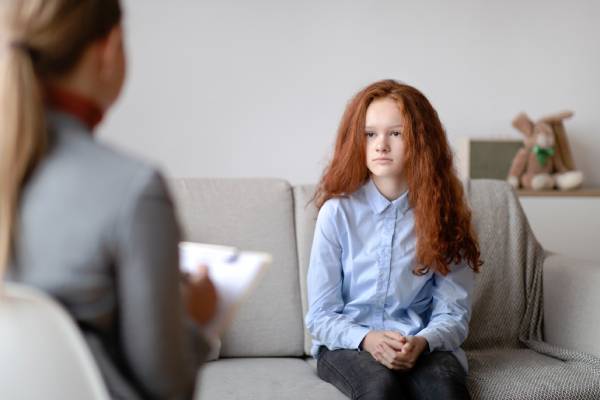
How Cognitive Behavioural Therapy (CBT) Can Help Children and Teens
Are you concerned about your child or teen’s mental health? Cognitive behavioural therapy (CBT), a type of talk therapy, can be an effective tool to help young people struggling with a wide range of emotional and behavioural issues, such as anxiety in children and depression in teens. In this blog post, we will explore the basics of how CBT works and explore its many benefits, as well as provide tips for making sure your child or teenager is getting the most out of their therapy sessions.
What Is Cognitive Behavioural Therapy (CBT)?
Cognitive behavioural therapy has gained much popularity in recent years, particularly for its effectiveness in treating behavioural problems in children. This form of therapy focuses on identifying and changing negative thought patterns, which can lead to more positive behaviours. By helping children understand the link between their emotions and actions, CBT therapists can offer children a practical, evidence-based approach to managing their behaviour.
While CBT techniques vary based on the individual needs of each child, the goal of CBT for children and teens is always the same: to help children achieve their full potential by teaching them to become more aware of their thoughts and emotions, and to develop the skills they need to control them.
Who Can Benefit from Cognitive Behavioural Therapy (CBT)?
While cognitive therapy was initially designed for adults struggling with depression and anxiety, today CBT is used to treat children and teens with a variety of behavioural and mental health issues, such as:
- Anxiety in children, such as generalized anxiety disorder, separation anxiety disorder, social anxiety disorder, or specific phobias
- Attention-deficit/hyperactivity disorder (ADHD), specifically children who need support in managing impulsivity, improving attention, and developing organizational skills
- Aggression, oppositional behaviour, conduct disorder, or defiance
- Trauma-related issues, such as post-traumatic stress disorder (PTSD) or the effects of adverse experiences
- Depression in teens, including low mood, loss of interest, and feelings of hopelessness
- Eating disorders, including anorexia nervosa, bulimia nervosa, or binge eating disorder
- Obsessive-compulsive disorder (OCD)
- Phobias or fears that significantly impact their daily functioning.
How Does Cognitive Behavioral Therapy Work?
In essence, CBT empowers children and teens to take control of their own thoughts and emotions, enabling them to overcome their negative beliefs and emotions. Below is a step-by-step guide on how CBT works.
- Assessment and Collaborative Relationship: The first step of CBT involves conducting a thorough assessment of the child’s symptoms, family dynamics, social environment, and any other relevant factors. This assessment helps to create a collaborative relationship between the therapist and child, which is essential for successful treatment.
- Identification of Negative Thoughts and Beliefs: Once the initial assessment has been completed, the CBT therapist will work with the child to identify any negative thoughts or beliefs that may be contributing to their symptoms. This can be done through a variety of techniques such as cognitive restructuring, journaling, or role-playing.
- Cognitive Restructuring: The next step is to help the child replace their negative thoughts with more positive ones. This can be done by teaching them new ways of thinking about situations and teaching them how to challenge irrational beliefs or distorted thinking patterns.
- Behaviour Activation and Skills Training: CBT for children also focuses on teaching new skills that can help children manage their emotions more effectively and increase positive behaviours. This includes teaching relaxation techniques such as deep breathing or progressive muscle relaxation.
- Exposure and Desensitization: For children who are struggling with anxiety-related issues, exposure therapy may be used in order to gradually desensitize them from fear-inducing triggers or situations. This involves exposing the child to increasingly difficult scenarios while providing coping strategies for managing fear or distress.
- Homework and Practice: Throughout treatment, it is important for children to practice what they have learned outside of cognitive therapy sessions in order for it to become a habit or part of their daily routine. Thus, anxiety therapists will often assign homework that allows children to practice new skills they have learned.
- Evaluation and Monitoring: Finally, it is important for psychotherapists and CBT therapists to evaluate progress throughout treatment in order to ensure that the goals set forth at the beginning of treatment are being met effectively over time.
Benefits of CBT for Children and Teens
Below are the many benefits of CBT for children and teens:
- Effective for various mental health issues such as anxiety, depression, and disruptive behaviour disorders.
- Develops practical coping skills for managing emotions, thoughts, and behaviours
- Targets and challenges negative thinking patterns to promote more balanced and realistic thoughts
- Enhances self-esteem and promotes a positive self-image
- Improves social skills and interpersonal relationships
- Provides skills to prevent relapse and maintain long-term well-being
- Involves the parents and support for better outcomes
- Can be implemented in school settings for early intervention and broader reach
- Supported by evidence-based research demonstrating its effectiveness
Benefits of CBT for Parents and Caregivers
Not only can cognitive behavioural therapy benefit children, but it can also help parents and caregivers in numerous ways, such as:
- Gain understanding and support in managing their child’s mental health challenges
- Learn effective communication strategies to foster a healthier parent-child relationship
- Develop coping skills to manage their own stress and emotions
- Acquire problem-solving techniques to address family challenges and support their child’s problem-solving skills
- Reinforce therapy at home, increasing the likelihood of positive outcomes
- Focus on self-care and setting boundaries for maintaining their own well-being
- Learn enhanced parenting skills for promoting positive behaviours and healthy discipline
- Experience decreased stress and guilt related to their child’s mental health challenges
- Promote long-term family well-being and support their child’s ongoing mental health needs
Ready to Support Your Child’s Mental Health? Get CBT Now!
When it comes to getting therapy for your child or teen, you want to ensure you choose the best possible approach. At Family Matters Centre, we believe that cognitive behavioural therapy (CBT) is an effective option for children and teens dealing with emotional and mental health challenges.
Our team of experienced child therapists in Burlington offers individualized CBT sessions to help your child learn to manage their thoughts and behaviours. Our teen counselling services also use CBT to support teenagers struggling with a variety of mental health issues, including depression, anxiety, and mood disorders.
If you’re looking for a child counselling or a CBT therapist near you, call us today at (905) 466-8023 or fill out our contact form to request an appointment.

by Shari Markovich
Shari is a Child Therapist who has worked with children and adolescents for more than 20 years. She uses a variety of counselling modalities, including Theraplay®, Cognitive Behavioural Therapy (CBT), and Family Systems. She is motivated to work with children and parents so families can function in healthy and supportive ways.



